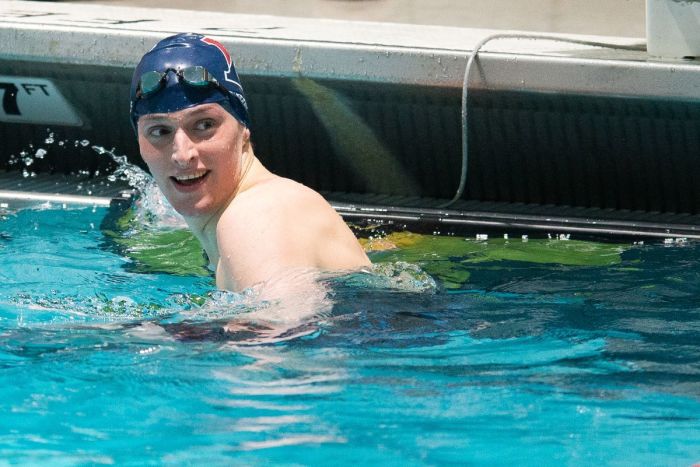Trans swimmer Lia Thomas ineligible to participate in Summer Olympics, court rules

A legal challenge seeking to overturn the eligibility requirements for biological males who identify as females seeking to participate in women's swimming has been dismissed, preventing one of the most notable trans-identified athletes from participating in the 2024 Summer Olympics in Paris.
A three-judge panel of the Court of Arbitration for Sport released its decision in the case of Lia Thomas v. World Aquatics on Wednesday. The decision centers on the efforts of Lia Thomas, a trans-identified male athlete who has broken women's swimming records and was an NCAA All-American in the women's division after previously competing on the University of Pennsylvania's men's swimming team for three years. Thomas challenged the eligibility requirements for participation in sporting events governed by World Aquatics.
World Aquatics is the global governing body for all aquatic sports, including the upcoming Summer Olympic Games. The body prohibits males who identify as female from competing in women's races and created an "open" category that will allow trans-identified athletes to compete.
Thomas' name is not included on the preliminary entry list for the U.S. Olympic swimming trials that will kick off this weekend in Indianapolis in the lead-up to the 2024 Paris Olympics next month.
The proceedings date back to last September when Thomas first filed a request for arbitration. According to the decision, the athlete maintained that the eligibility requirements for participation in World Aquatics events amount to discrimination "contrary to the Olympic Charter, the WA Constitution, and Swiss law including the European Convention on Human Rights (the 'Convention') and the Convention on the Elimination of all forms of Discrimination against Women (the 'CEDAW')."
Thomas' insistence that World Aquatics violated Swiss law reflects the fact that the worldwide governing body of aquatic sports is based in Switzerland. The court determined that Thomas did not have standing to bring the challenge in the first place.
While USA Swimming granted Thomas' request for self-identity verification on Jan. 5 and confirmed that the athlete was registered to compete in the female category, this development took place four months after Thomas filed the complaint.
Satisfying the self-identity verification is a prerequisite for participation in what the organization characterizes as "Elite Events."
Examples of "Elite Events," as identified in the opinion, include "any United States Olympic and Paralympic Committee ('USOPC') Delegation Event and/or Protected Competition as defined in the USOPC Bylaws; World Aquatics Events; Pan Pacific Championships; World University Games; USA Swimming Nationals, Junior Nationals, U.S. Open, International Team Trials, U.S. Olympic Team Trials - Swimming."
The panel of arbitrators noted that "the Athlete did not apply for — let alone was granted — the right to participate in 'Elite Events' within the meaning of the USA Swimming Policy," adding that Thomas "is currently only entitled to compete in USA Swimming-events that do not qualify as 'Elite Events.'"
Noting that Thomas "is not entitled to participate in 'Elite Events' within the meaning of USA Swimming Policy, let alone to compete in a WA Competition, which occurs upon registration with WA prior to a competition or upon setting a performance which leads to a request for registration as WA World Record," the court concluded that the athlete "is simply not entitled to engage with eligibility to compete in WA Competitions."
The decision comes at a time when the participation of trans-identified male athletes in women's sports has generated considerable outrage and debate. The decision did not rule on the merits of the eligibility policies.
Critics of allowing biological males who identify as females to compete in women's sports point to biological differences between males and females that will put biological females, on average, at a disadvantage if they are forced to compete against trans-identified males.
USA Powerlifting, one of several sporting organizations that have enacted policies restricting the ability of trans-identified males to compete in women's sports, has identified "increased body and muscle mass, bone density, bone structure, and connective tissue" as advantages enjoyed by males that give them an advantage over their female counterparts in athletics.
A 2020 study published in the British Journal of Sports Medicine suggests that trans-identified male athletes maintain such advantages even after two years of taking feminizing hormones.
Twenty-five states have enacted measures or regulations requiring athletes to participate on sports teams that align with their biological sex as opposed to their stated gender identity.
The states that have implemented protections for female athletes are Alabama, Alaska, Arizona, Arkansas, Florida, Idaho, Indiana, Iowa, Kansas, Kentucky, Louisiana, Mississippi, Missouri, Montana, North Carolina, North Dakota, Ohio, Oklahoma, South Carolina, South Dakota, Tennessee, Texas, Utah, West Virginia and Wyoming.
Ryan Foley is a reporter for The Christian Post. He can be reached at: ryan.foley@christianpost.com





























